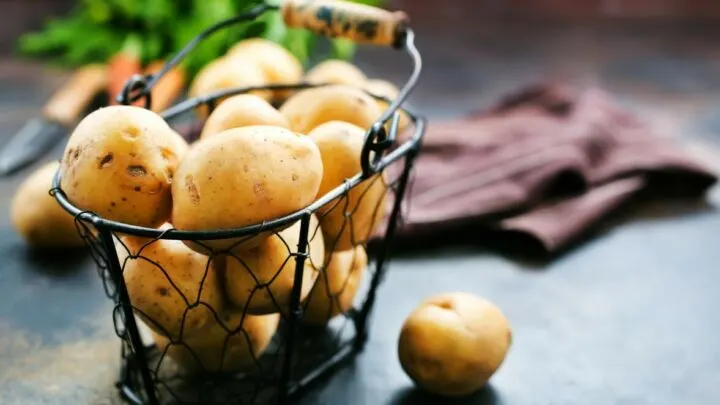Eventually, food goes bad, and while we can extend the life of food through refrigeration and freezing, eventually, it will get to the point where it needs to be tossed.
This is where expiration dates come in. These dates are especially useful and give people a vague idea of when food should be eaten, refrigerated, or frozen.
Some foods last longer than others, but the expiration dates are extremely helpful in every case.
One popular food people may wonder about going bad is potatoes.
In this article, you will learn if potatoes can go bad, how long they can last, and other information that will help you make an informed decision.
Contents
Can Potatoes Go Bad, and if So, How Long Do They Last?
Potatoes are comfort food for many, but like other foods, they can go bad.
The length of time a potato can last depends on the type of potato and the way they are stored. For potatoes, this includes:
- If raw potatoes are kept in a cool and dark, dry place, then they can last a few months. Russet/white potatoes last up to five months, while Yukon gold/red potatoes last up to three months.
- Potatoes left on the counter last about two weeks. If exposed to room temperature that has the potential to become warmer, then the two weeks could drop down to one.
- Raw potatoes in the fridge last about four weeks, but be aware that the texture can change.
- Finally, cooked potatoes can last about a week in the fridge and several months in the freezer.
The better condition the potatoes are in, the longer they can last.
What Happens if You Eat Bad Potatoes?
Despite our best efforts to avoid eating bad food, it does happen. If you do end up eating a spoiled potato, then you could be putting yourself at risk of being infected with bacteria.
This can lead to common illnesses like salmonella, listeria, and botulism poisoning. Food poisoning is also a possibility that isn’t as serious as the other illnesses we mention, but it can be very unpleasant.
Common symptoms of these illnesses include:
- Nausea/Vomiting
- Muscle Aches/Cramping
- Diarrhea
- Fever
Most of the symptoms involve the gastrointestinal system and issues in that area of the body. Chances are you won’t end up getting more than what feels like a moderate to mild stomach bug, but there is always a risk of the illness getting more serious.
One other thing to watch out for is green spots or sprouts on potatoes. You don’t want to eat other of them because they have a high amount of glycoalkaloids.
If you consume this, it can lead to you having headaches, vomiting, and diarrhea.
The best way to avoid any chance of getting sick is to pay attention to the signs that tell you if a potato is bad, which we are going to cover in the next section.
How To Tell if Potatoes Are Bad
There are a few ways to tell if a potato has gone bad. Some ways to do this include:
- Raw potatoes that are mushy are a telltale sign that something is wrong. Normally, they are firm to the touch.
- Any potato that has a bad smell is on its way out.
- Mold is another sign that the potato is bad. This is one of the more obvious ones because mold makes itself very much known to the person.
- A potato that has sprouted on it means it’s on its way to spoiling. If you remove the sprouts, then it’s safe to use, but only if you remove them. Under no circumstances should you eat them. Same goes for eating a potato that has greenish skin on it. This must also be removed immediately.
- For cooked potatoes, give them a look over and the smell test. If they have an odor or mold on them, then they need to be tossed right away.
By paying attention to these signs, you’ll be able to tell when your potatoes are starting to go bad. The best way to avoid this is by safely storing your potatoes in the first place.
How to Safely Store Potatoes
There exist several ways to safely store your potatoes and ensure that they don’t spoil before you have a chance to do something with them. This includes:
- We mentioned this briefly before, but always store raw potatoes in a cool, dark, and dry place. You should also either leave it in the bag they come in or out in the open. They need to be exposed to the air.
- Cooked potatoes can be treated a bit differently. You can put them in a container and put them in the fridge or freezer. Just make sure to follow proper freezer and fridge storage to make sure they don’t spoil before you have a chance to eat them.
- One thing we feel we should mention is that fresh potatoes should ideally not be kept in the fridge and not be stored in the freezer. By putting them in either of these environments, then you are going to end up quickening the spoiling process.
By following these three simple suggestions, you’ll be able to safely store your potatoes and then cook them for a good old-fashioned American comfort dinner.
Just make sure to double-check to see if they’re fresh, even if you store them correctly.
Hey, better to be safe than sorry!
Final Thoughts
And there you go, all your potato lovers out there! Potatoes can go bad, and sometimes we can eat bad potatoes.
This is why knowing the signs of spoilage and being able to safely store it are important things to know.
Eating bad potatoes is not something you should do, but we know accidents can happen to the best of us.
By looking for signs of spoilage and safely storing the potatoes in the first place, you can avoid eating potatoes that have gone bad.
So, what are you all waiting for? Get out there and start cooking up your potatoes!
You might also be interested in the following:
- Do Spices Go Bad?
- Do Pickles Go Bad?
- Do Carrots Go Bad?
- Do Sweet Potatoes Go Bad?
- Do Mushrooms Go Bad?
- Do Onions Go Bad?
- Do Hot Dogs Go Bad?

I have been smoking and grilling meat from an early age and enjoy sharing my knowledge and expertise through the hundreds of articles I have written about BBQ. I hope to make everyone’s BBQ journey that little bit easier.

